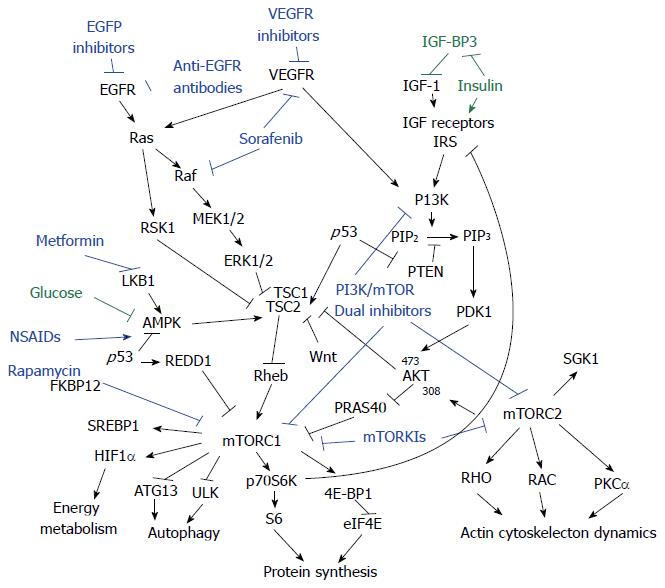Copyright
©2014 Baishideng Publishing Group Co.
World J Gastroenterol. Apr 21, 2014; 20(15): 4178-4188
Published online Apr 21, 2014. doi: 10.3748/wjg.v20.i15.4178
Published online Apr 21, 2014. doi: 10.3748/wjg.v20.i15.4178
Figure 1 Crosstalk between mechanistic target of rapamycin signaling pathway and colorectal oncogenic pathways.
PI3K/AKT and Ras/MAPK pathways are the major upstream mediators of mechanistic target of rapamycin (mTOR) signaling pathway in colorectal cancer. Therapeutic efforts for colorectal cancer targeting mTOR signaling include Rapamycin (or Rapalogs) inhibition as well as mTOR kinase inhibition, plus in combination with blockage of growth factor receptors, and components in upstream pathways such as Raf and PI3K, etc. New players regulating the mTOR pathway such as non-steroidal anti-inflammatory drug (NSAIDs) and metformin merit further investigation. IGF: Insulin like growth factor; SGK1: Serum- and glucocorticoid-induced protein kinase; PRAS40: Proline-rich Akt substrate 40 kDa; TSC1: Tuberous sclerosis-1; TSC2: Tuberous sclerosis-2; AMPK: Adenosine monophosphate-activated protein kinase; eIF4E: Eukaryotic translation initiation factor 4E; RSK1: Ribosomal S6 kinase.
- Citation: Wang XW, Zhang YJ. Targeting mTOR network in colorectal cancer therapy. World J Gastroenterol 2014; 20(15): 4178-4188
- URL: https://www.wjgnet.com/1007-9327/full/v20/i15/4178.htm
- DOI: https://dx.doi.org/10.3748/wjg.v20.i15.4178









